How to Merge Google Calendars - 2026 Guide
Table of Contents
Ready to Merge Your Google Calendars?
Create a OneCal account to merge multiple Google Calendars, create and share Booking Links, and more.
Are you tired of managing Google Calendars and looking for methods to merge multiple Google Calendars? In this blog post, we'll thoroughly explain the best ways to merge Google Calendars, their pros and cons, and our recommendations.
Prefer video? Here is our step-by-step tutorial on how to merge Google Calendars:
Why is merging Google Calendars important?
Merging Google Calendars is important because it helps us streamline our availability and reduces double bookings due to colleagues not knowing our full availability.
Let’s say you have a personal Google Calendar and a work Google Calendar. If you’re booked on your personal Google Calendars, your colleagues don’t know that, leading to them potentially booking meetings with you.
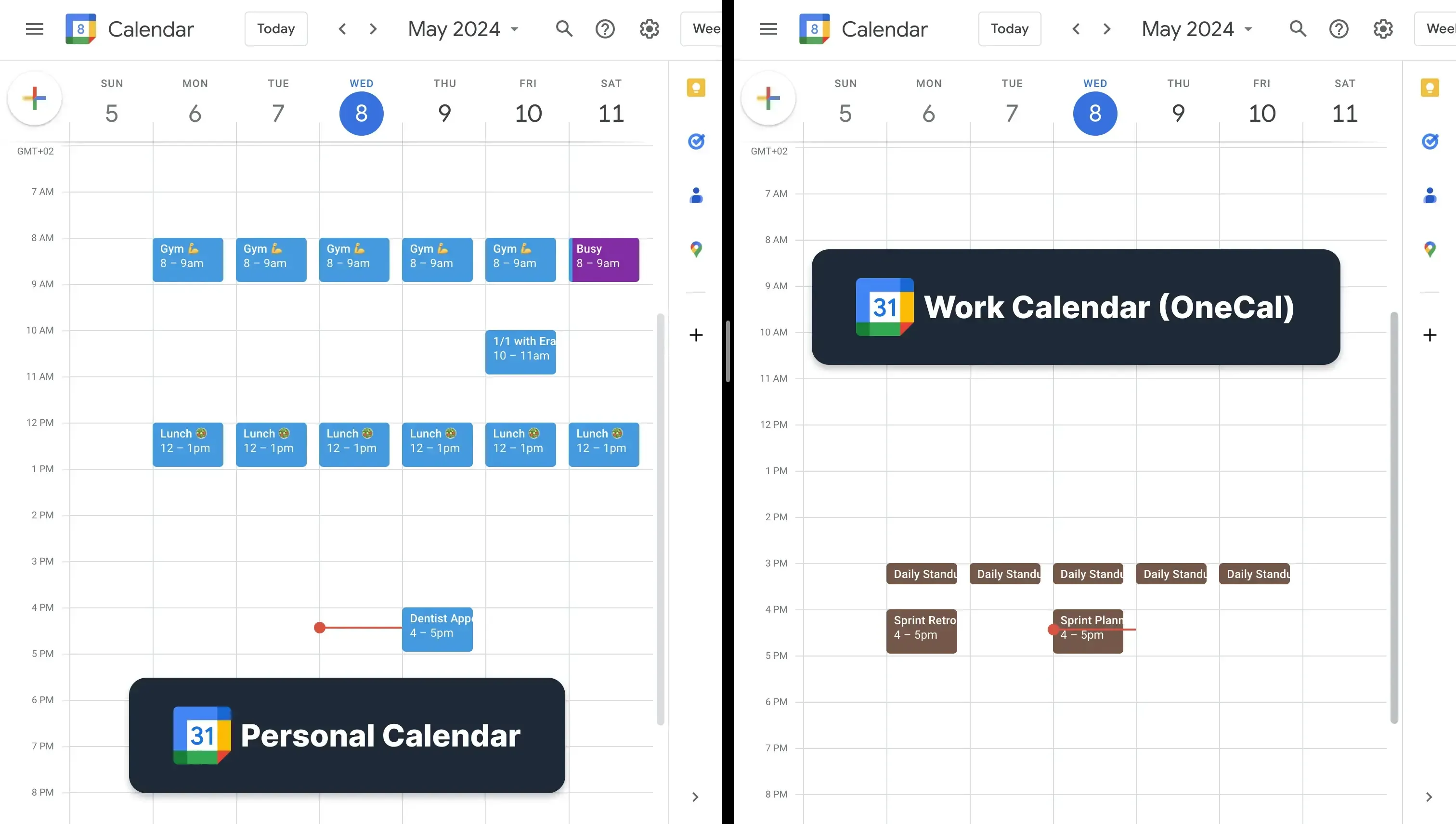
Example: You work at OneCal, and Kleo booked a meeting with you on Friday at 4 PM. What Kleo doesn’t know is that you have a personal commitment at that time, booked through your personal calendar. This inevitably leads to a double booking, and you’ll have to communicate with Kleo that you’re booked at that time, and you have to figure out a new time to meet.
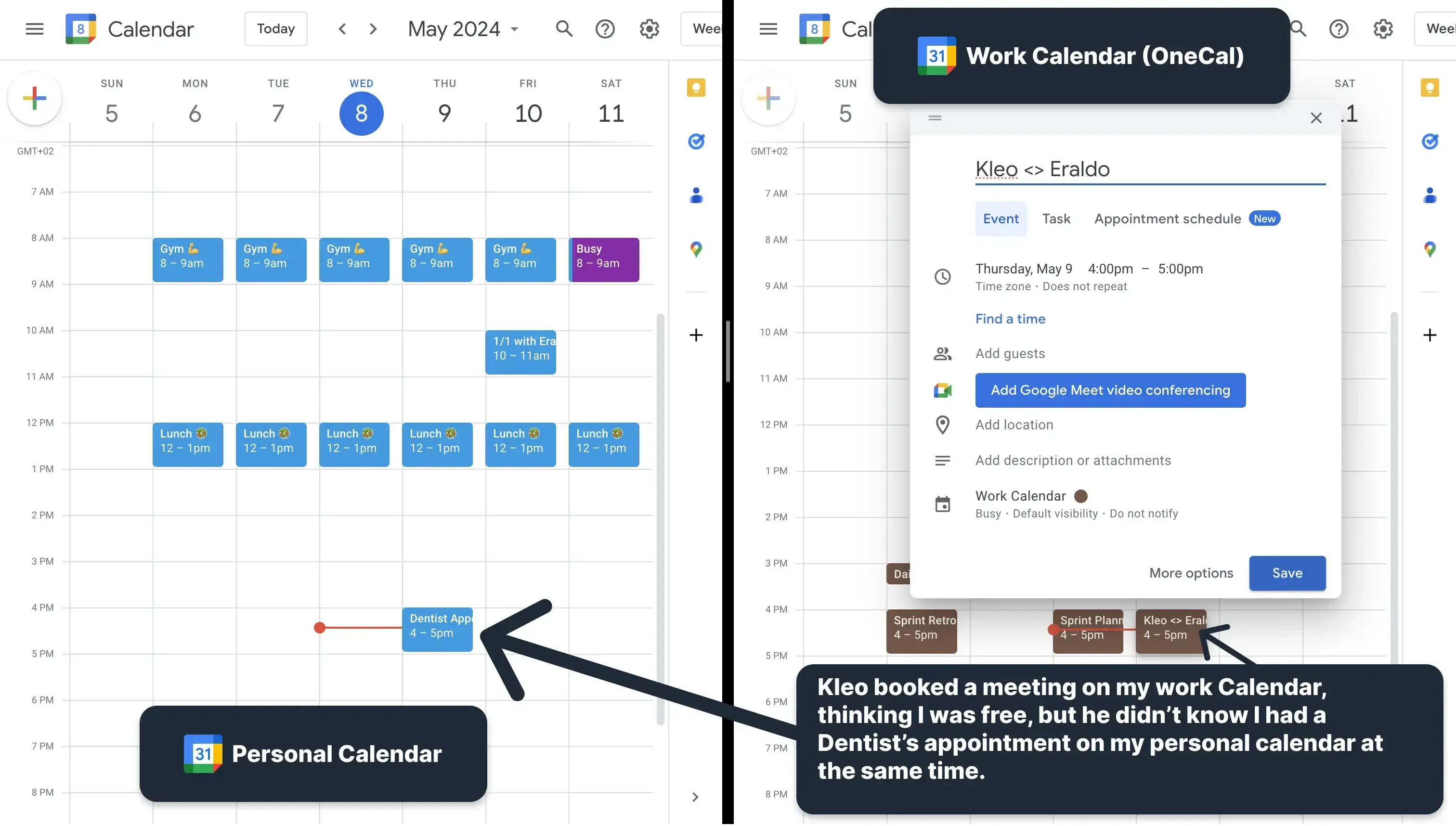
If your Google Calendars were merged, Kleo would see that you’re booked at 4 PM and find a better-suited time to meet.
This gets even more complex when you manage Outlook and Google Calendars in addition to your personal calendar.
Merging Google Calendars via Calendar Sharing
Google Calendar allows you to share a calendar and import it to another Google account, but that’s not the same as merging these two calendars.
When you share a Google Calendar and import it to another account, you’re essentially creating a replica of that calendar to the Google Account.
For example, if you share your personal Google Calendar and import it to your work account, you’re simply creating a replica of your personal calendar in your work Google Account. The work Google Calendar and personal Calendars are still separate calendars.
For example, to merge two Google Calendars via Calendar sharing, you would follow these steps:
Visit Google Calendar on the web and log in. You can access Google Calendar on the web by visiting https://calendar.google.com/calendar/u/0/r
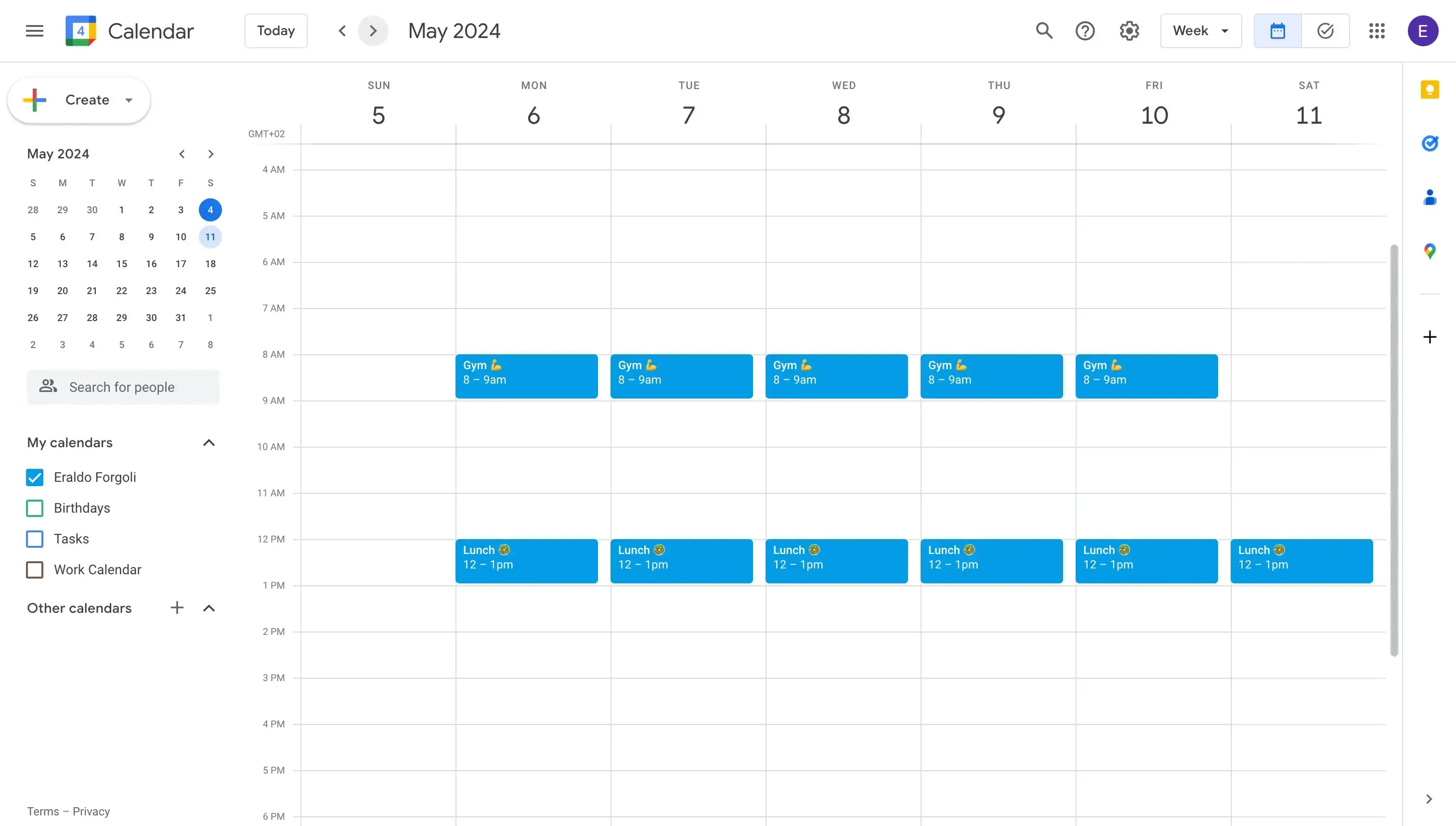
Locate the calendar you want to merge. The calendars section is located on the left sidebar of the page.
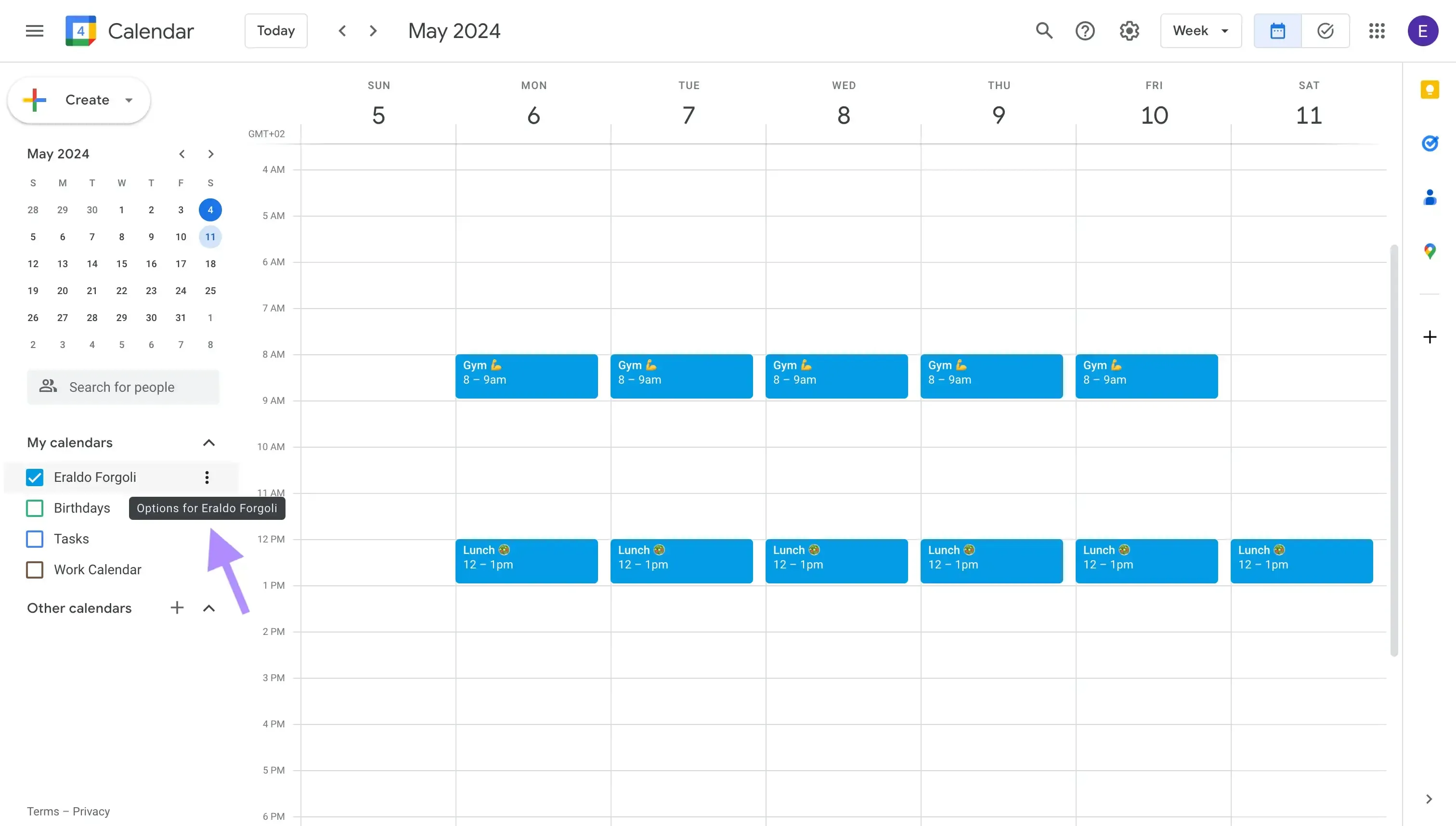
Click the three-dot menu icon. The three-dot icon pops up the menu that contains the calendar actions.
Click "Settings and Sharing" on the menu that pops up after clicking the three-dot menu.
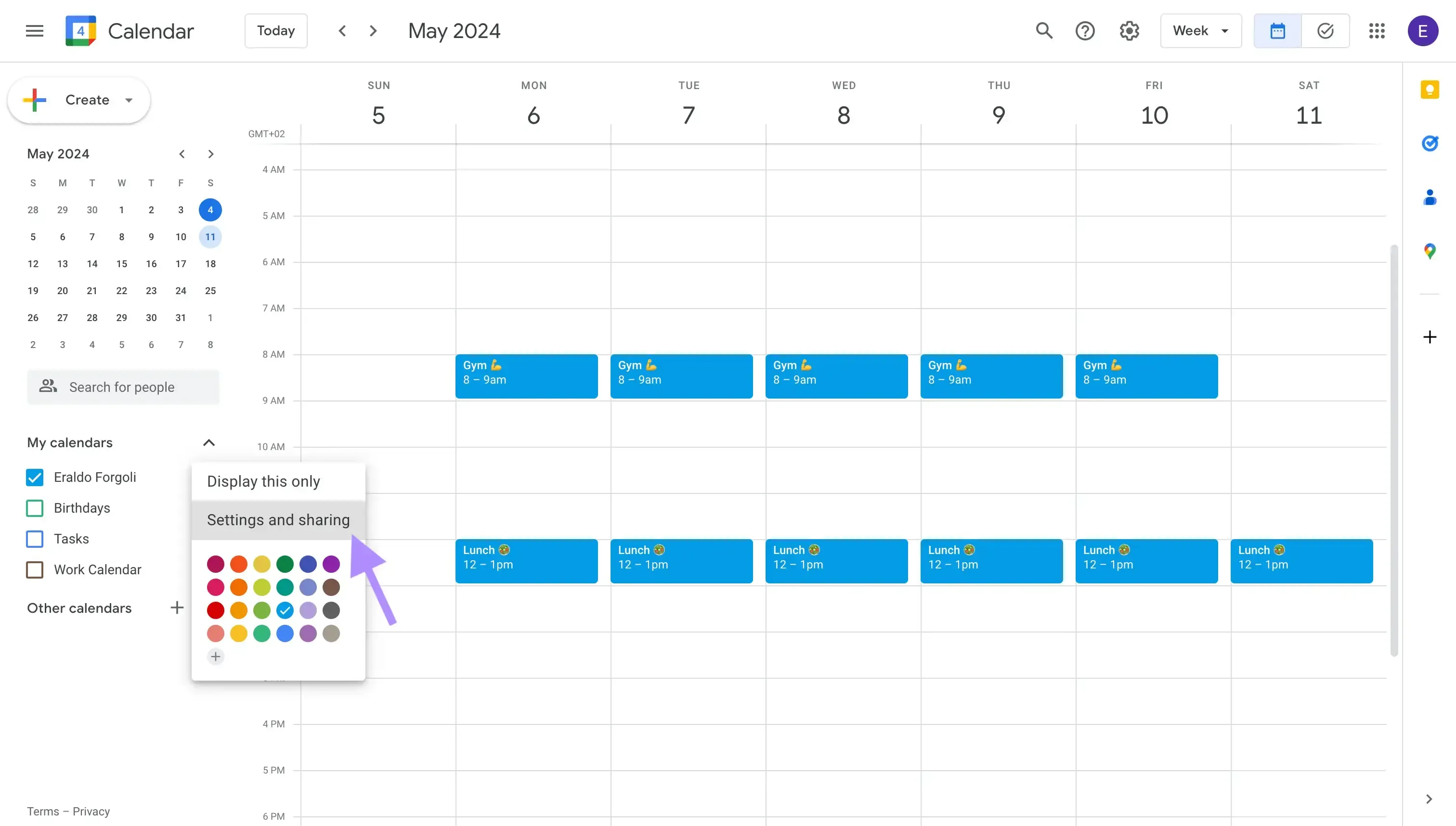
Enable "Make available to public": This is one of the downfalls of merging by calendar sharing, as we have to make the calendar public, making the calendar events will be available to the world, including Google Search.
For a safer approach to merging Google Calendars, we recommend using a Calendar Sync Tool that directly integrates with Google Calendar and keeps your events private (not available to Google Search or other channels).
Select "See Only Free/Busy Details": Even though the events are public, you can hide the details. This is not ideal, as it means that you won't be able to see the event details on the imported Google Calendar as well.
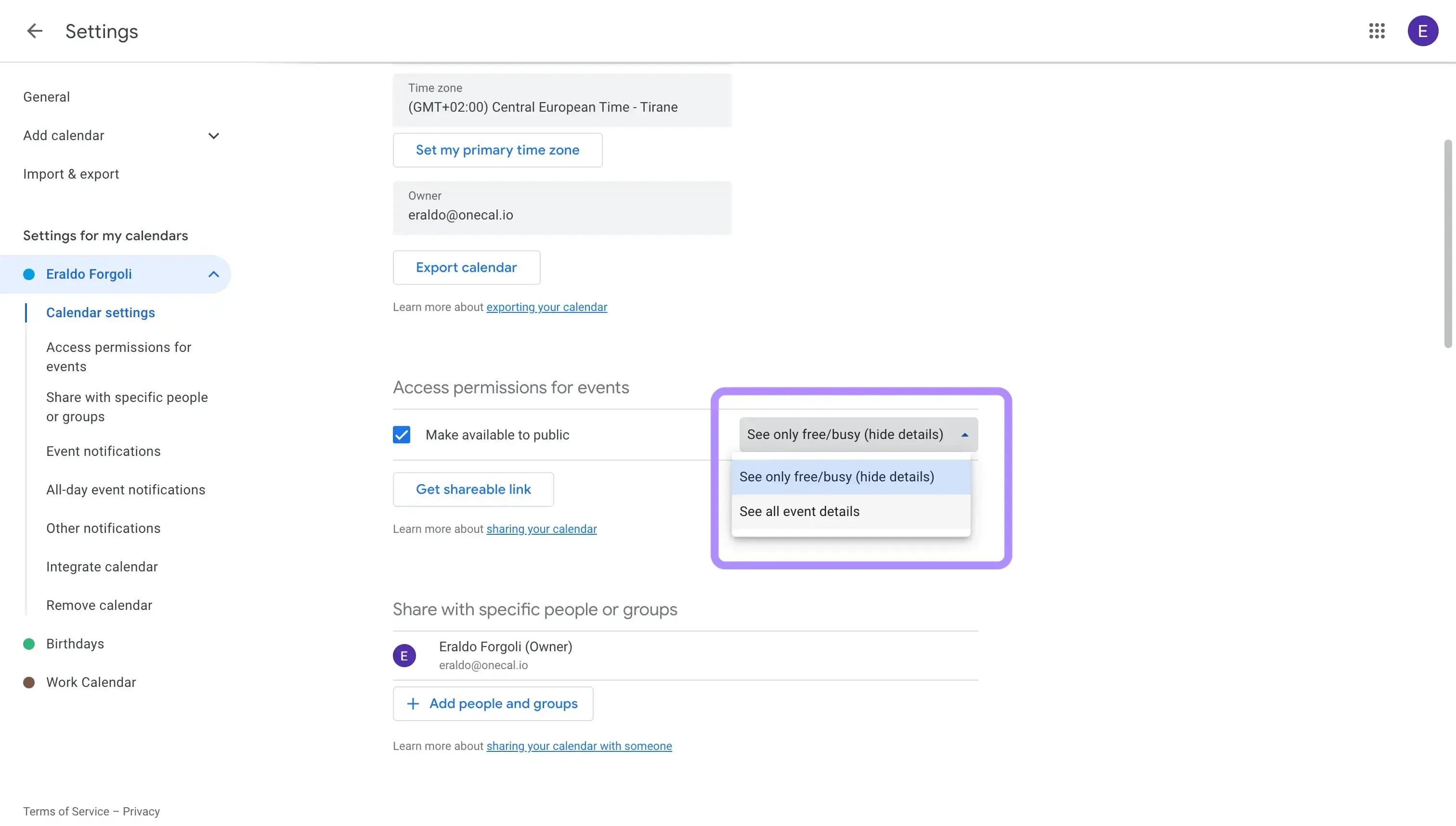
Scroll until you see "Public Address in iCal Format" and copy it. We'll need that URL to paste it into the other Google Account.
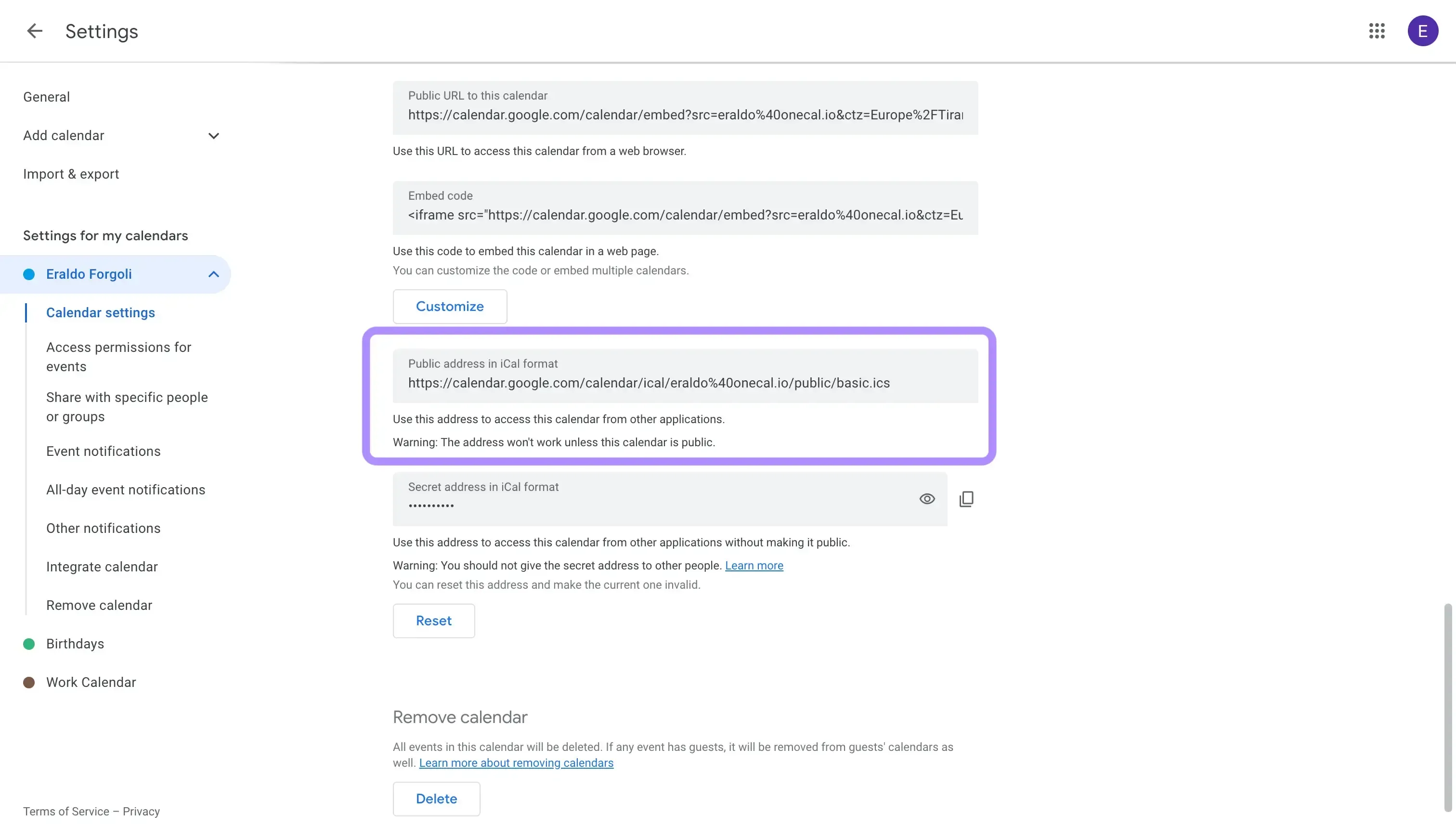
Open the Google account you want to merge this calendar to.
Under "Other Calendars", Click the + icon: The Other Calendars section is located on the left sidebar, below the "Calendars" section.
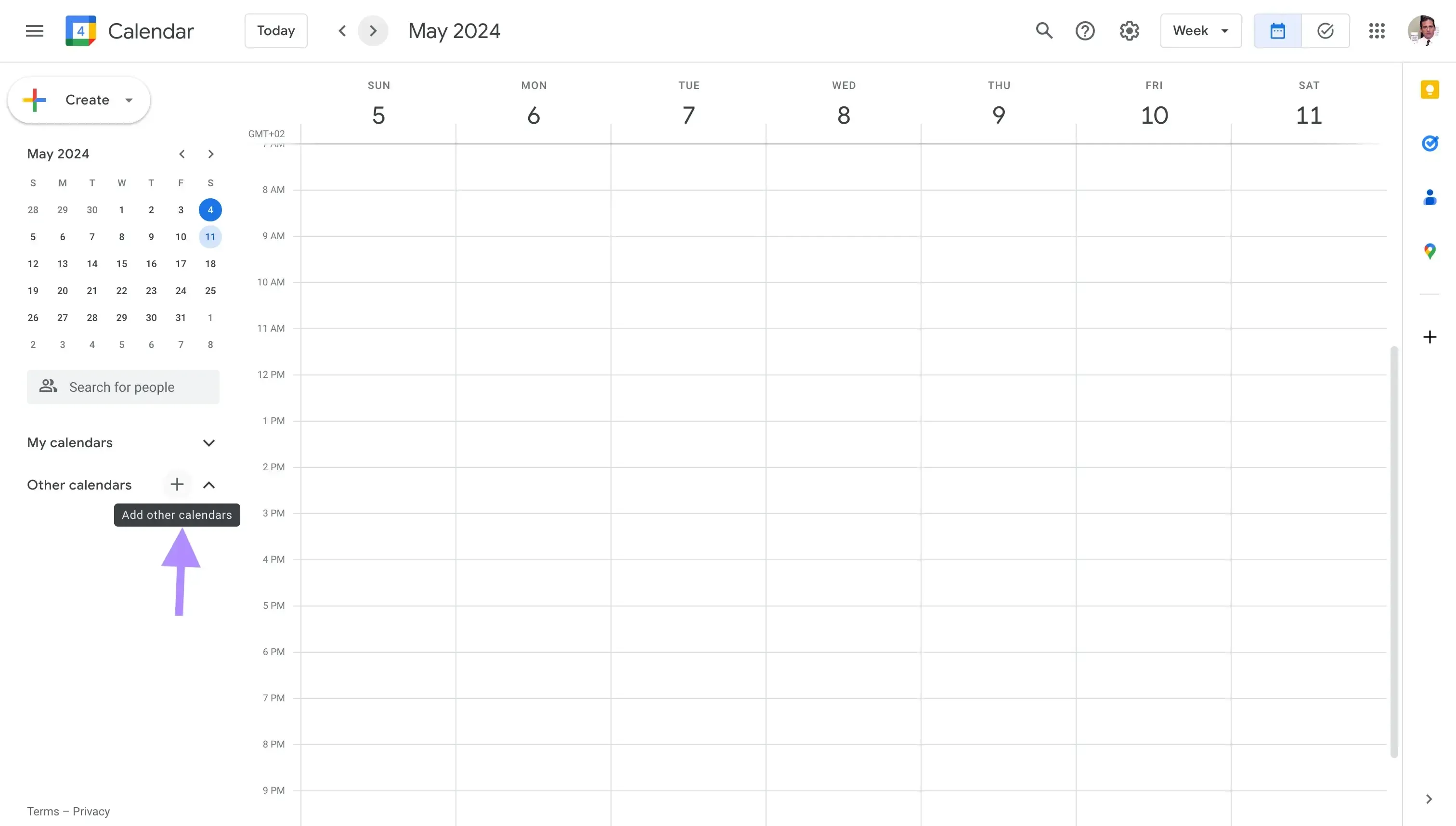
Click "From URL" on the popup menu.
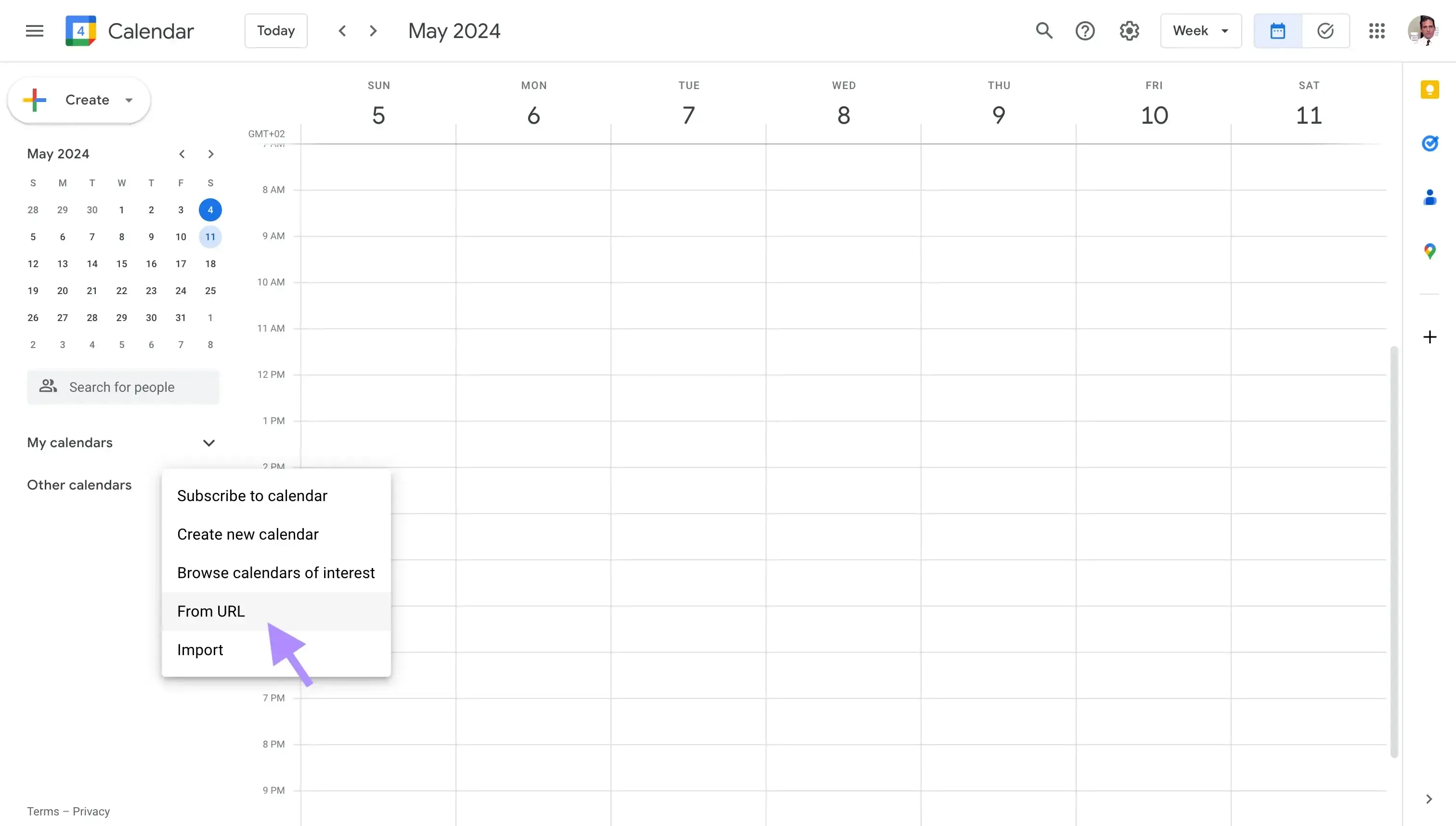
Paste the "Public Address in iCal Format" we copied from the first calendar.

Click the "Add Calendar" button
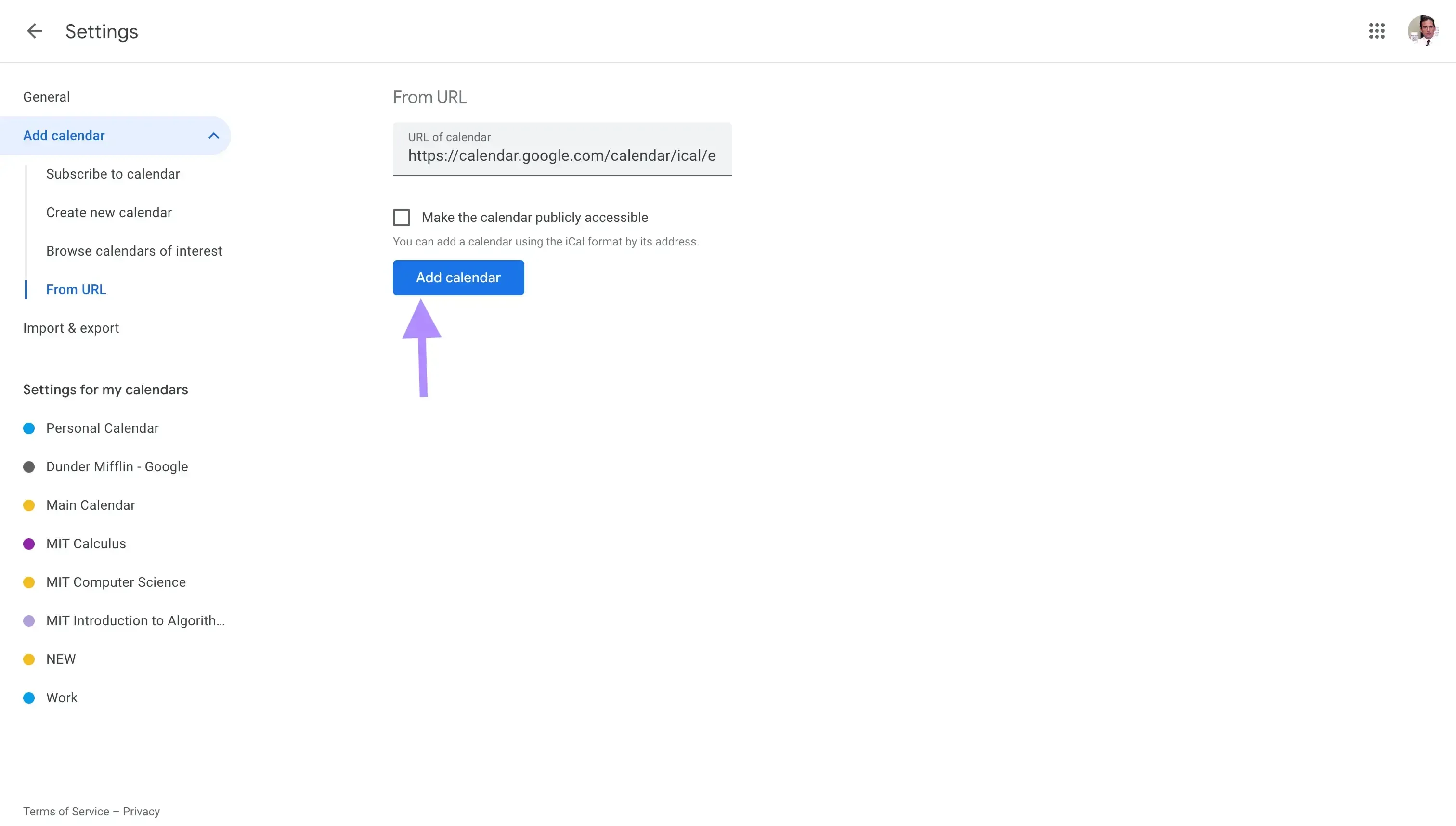
Your Calendar is now located under the "Other Calendars" Section.
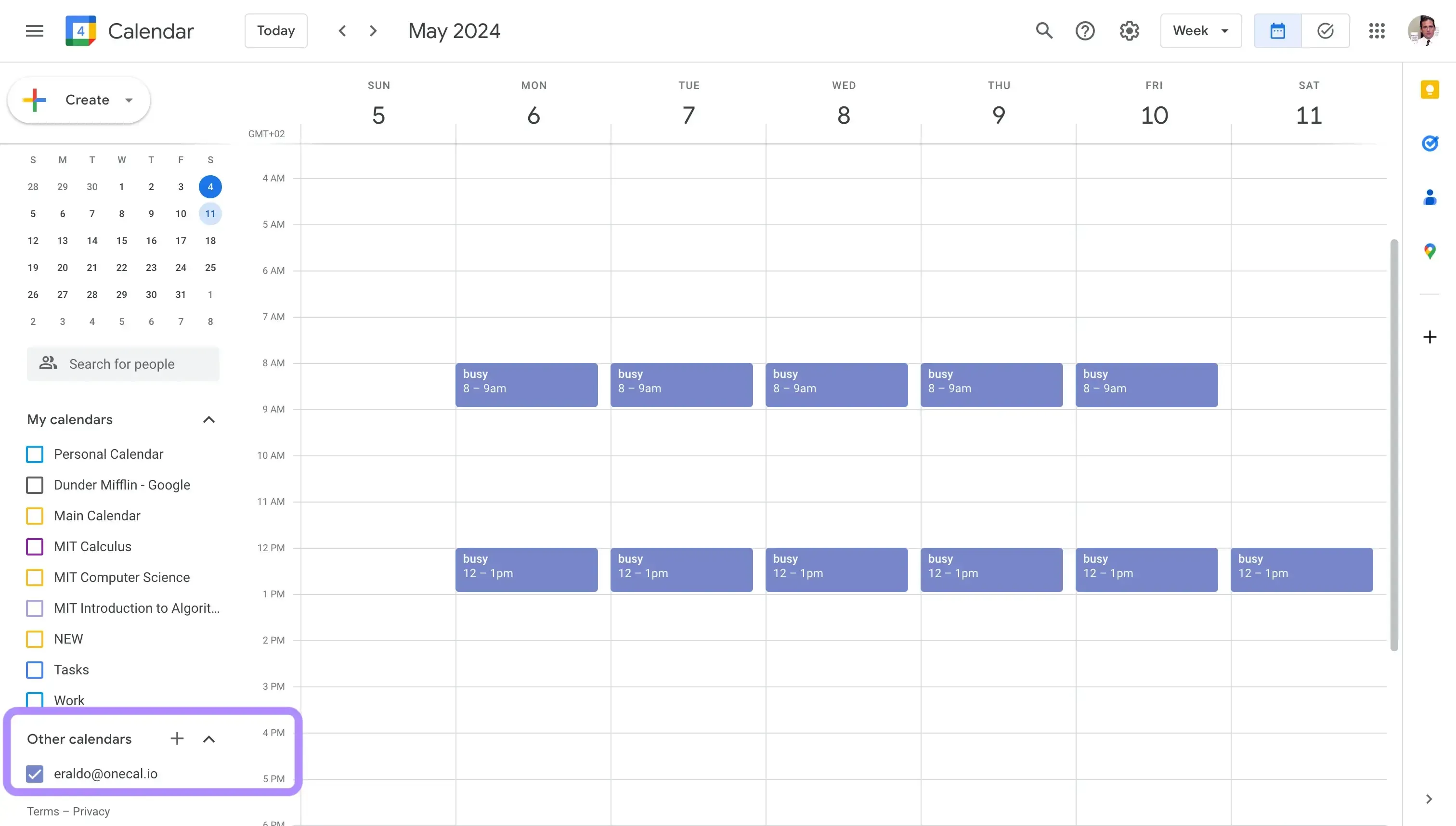
This is useful if you want to see your personal Google Calendar from your work Google Account, but others can’t see your Personal Google Calendar events when booking time through your work Google Calendar, leading do meeting conflicts.
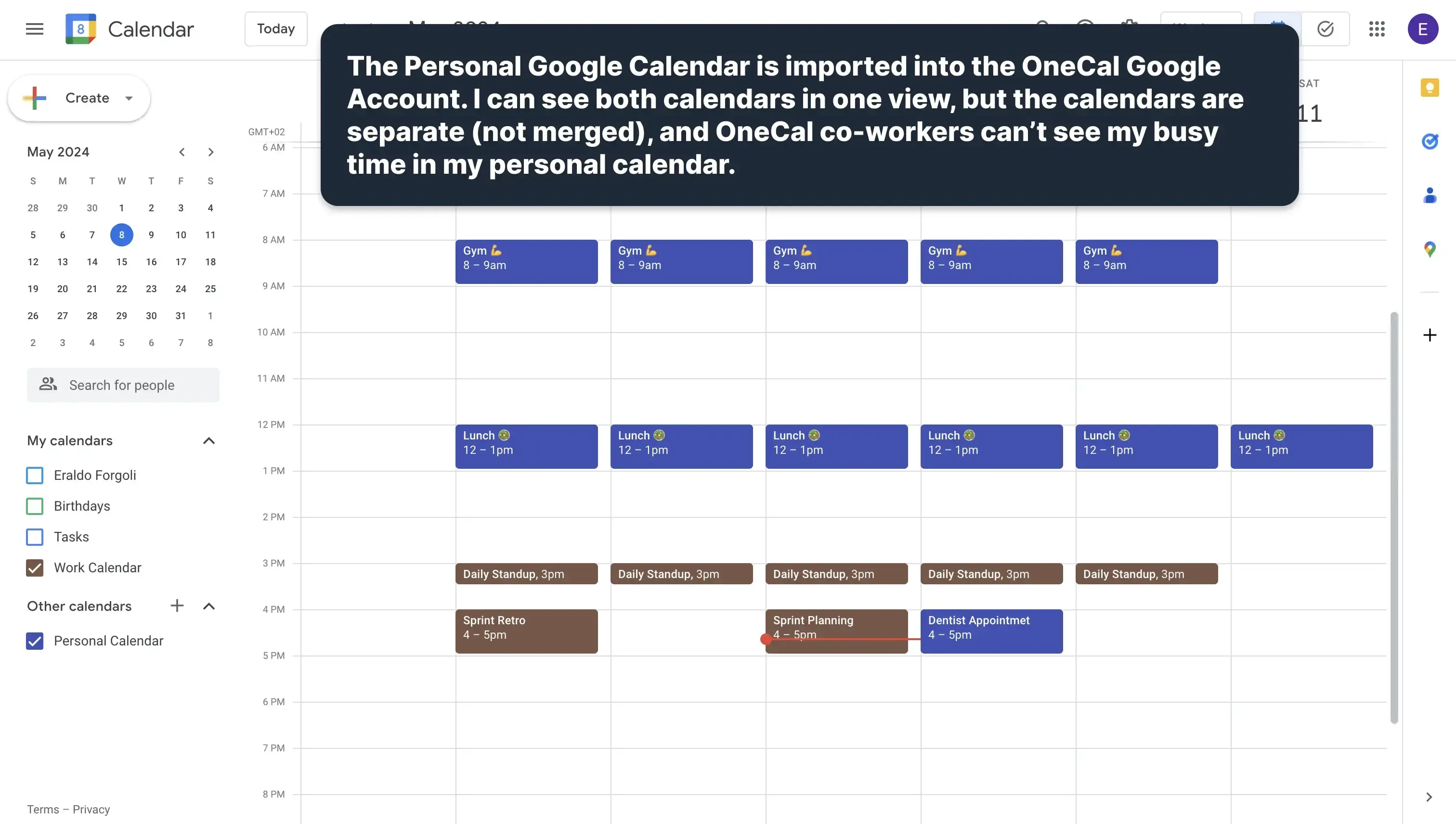
Pros of merging Google Calendars by calendar sharing
Sharing Google Calendars and importing them to other accounts might not merge the calendars, but it has some benefits:
You can view multiple Google Calendars in one place: You can easily view your personal Google Calendar from your Work Google Account, making it easy to see your full schedule. You could also share your work Google Calendar to your personal account.
Cons of merging Google Calendars by calendar sharing
Google Calendar sharing doesn't merge calendars: Even though we shared our personal Google Calendar with our Work Google account, it doesn't mean that the calendars are merged. This is because we've simply imported the personal Google Calendar to our Work Google Account. The Calendars are still separate. If a coworker were to book a time through your work Google Calendar, they wouldn't be able to see the availability of your imported Google Calendar, leading to meeting conflicts.
Little Exporting Privacy when merging Google Calendars: When exporting the first calendar (Calendar A), Google Calendar warns you: Making your calendar public will make all events visible to the world, including via Google search. This means that your private Google Calendar events will be available to the public. This is a major concern if you’re trying to export a work Google Calendar, as meetings might be sensitive (same for your personal Google Calendar). The only way to protect yourself is by selecting See Only Free/Busy.
Hard to set up. Merging Google Calendars takes a couple of minutes, as you’ll have to follow 11 steps for each Google Calendar to merge. Furthermore, you might have to troubleshoot possible issues.
How to Merge Google Calendars automatically?
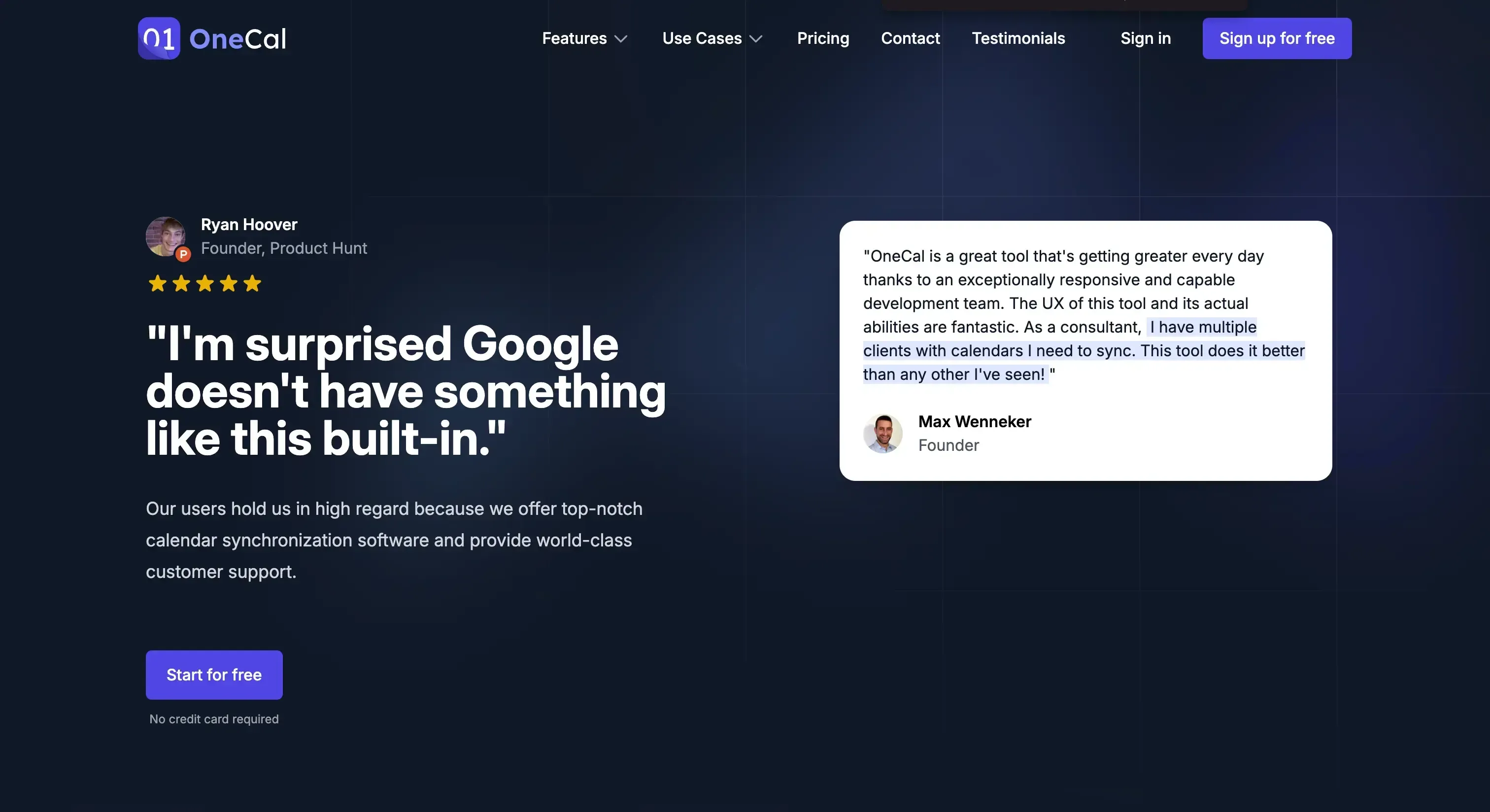
You can use a Calendar Sync Tool like OneCal to merge two or more Google Calendars, so calendars mirror each other in real-time.
OneCal uses the official Google Calendar API to merge multiple Google Calendars in real-time. Unlike sharing, OneCal doesn’t create a separate Google Calendar but directly creates events in your calendars.
OneCal allows you to:
Merge two or more Google Calendars
Keep your private events private without the need to make the calendar public
Choose what to merge from a Google Calendar to another
To merge two (or more) Google Calendars, follow these steps:
1. Create a OneCal Account For Free
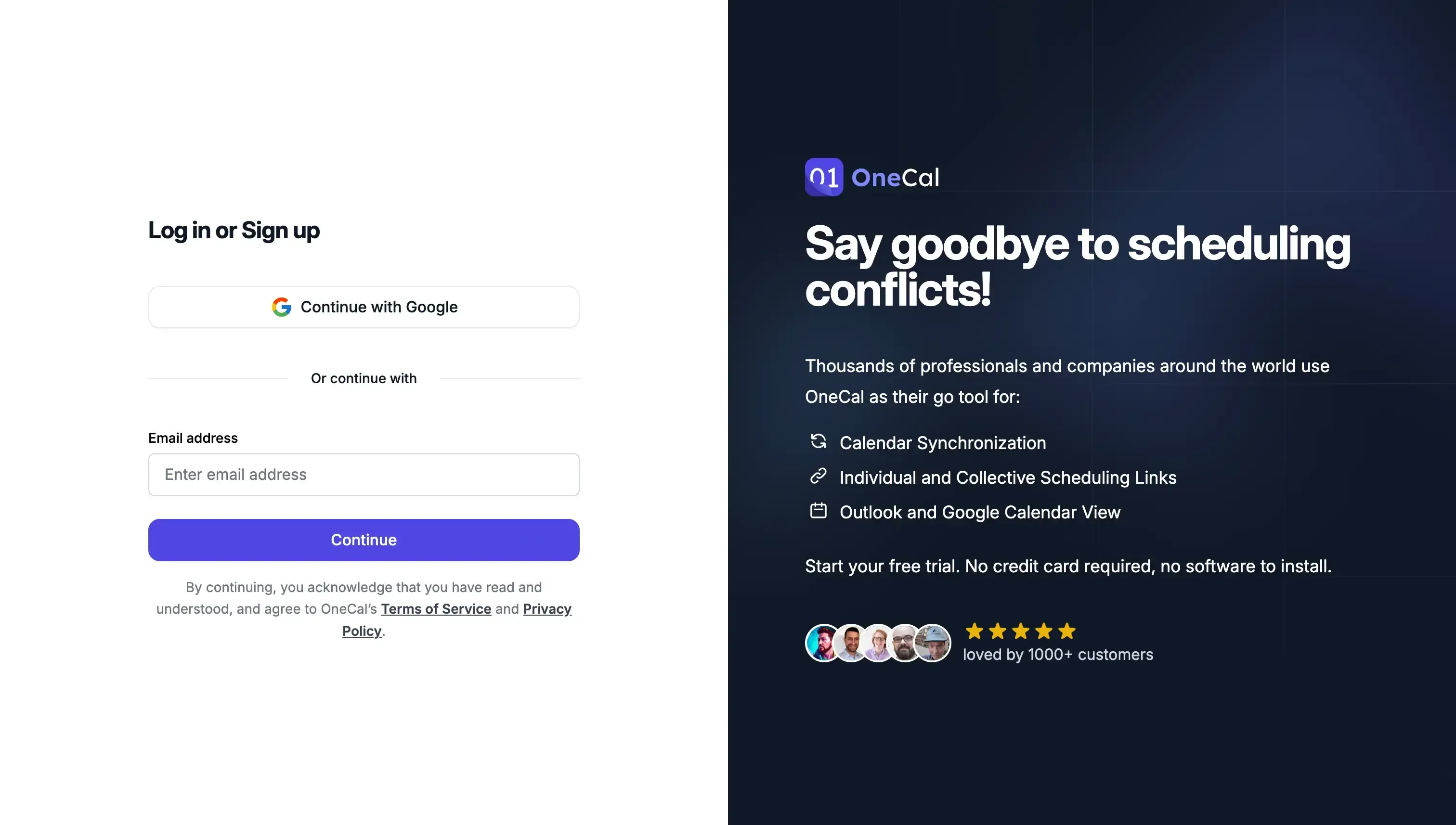
Sign up for OneCal for free for a 14-day free trial; no credit card is required.
2. Connect the Google Calendars you want to merge
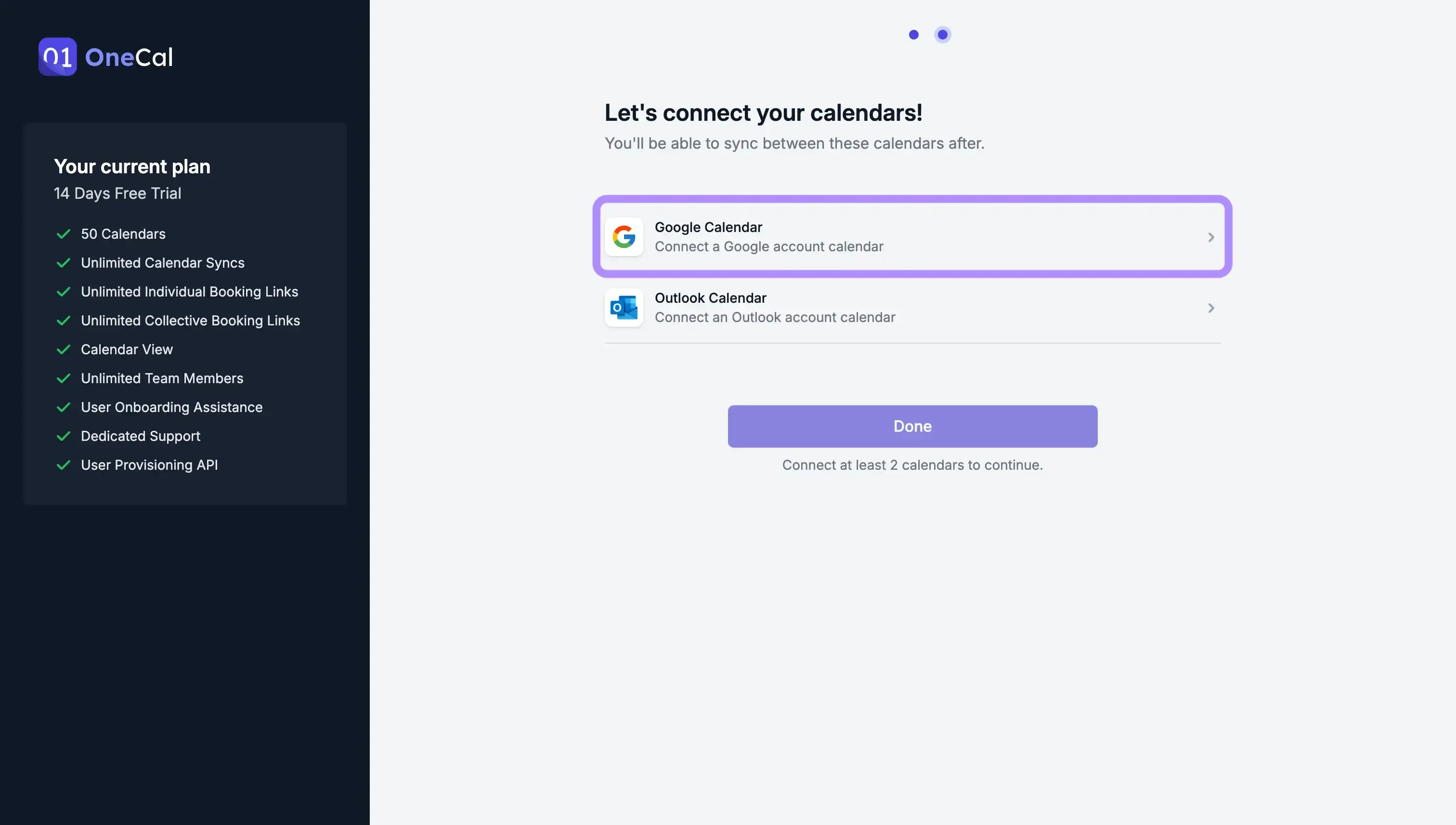
OneCal allows you to merge as many calendars as you want. The connection uses Google OAuth, which is secure and you can revoke the access at any time.
After connecting a Google Account, you can select which Google Calendars to import:
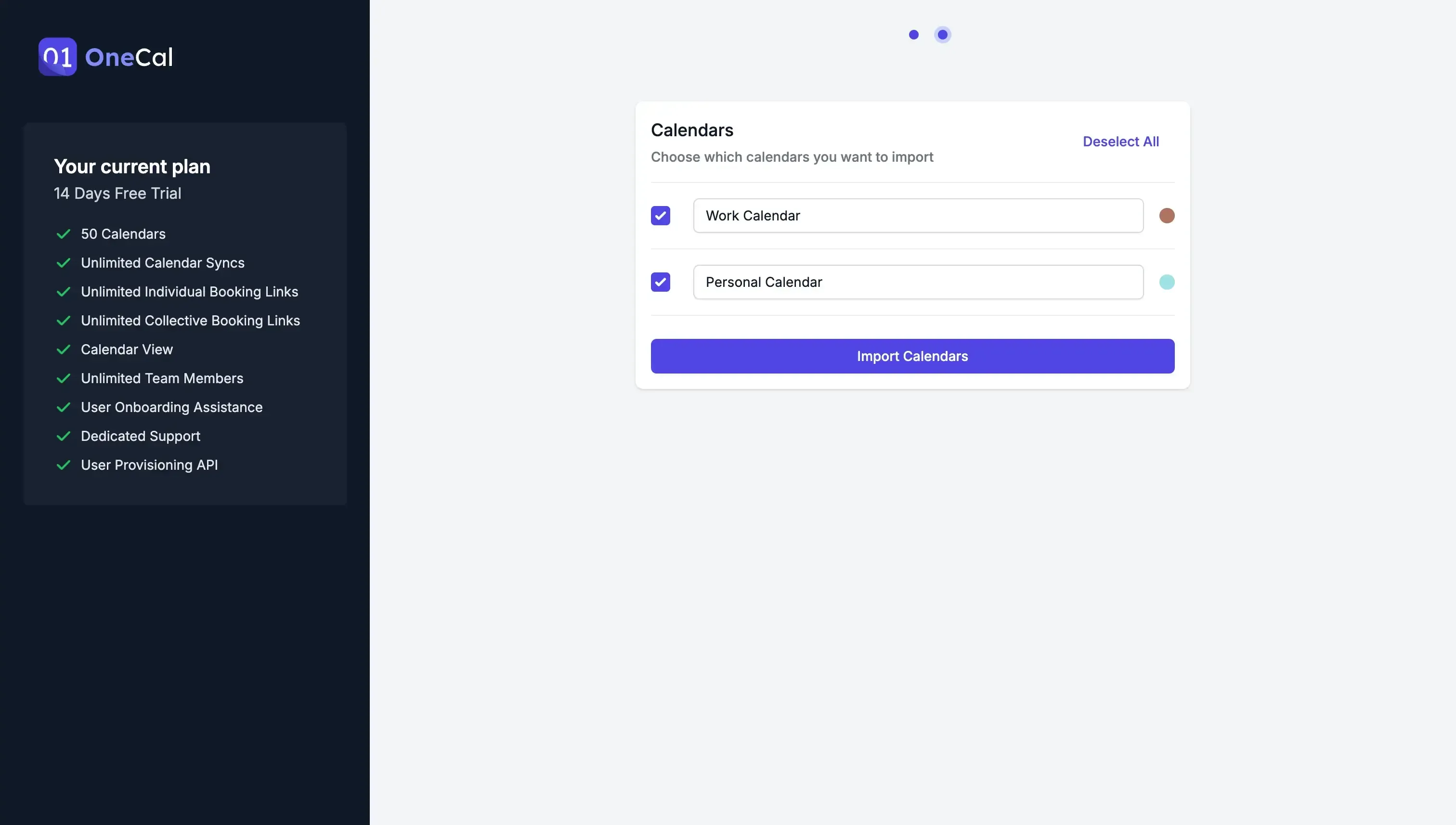
3. Click ‘Start New Sync’
The first thing to do after you connect your Google Calendars is to start merging them, no need for additional setup.
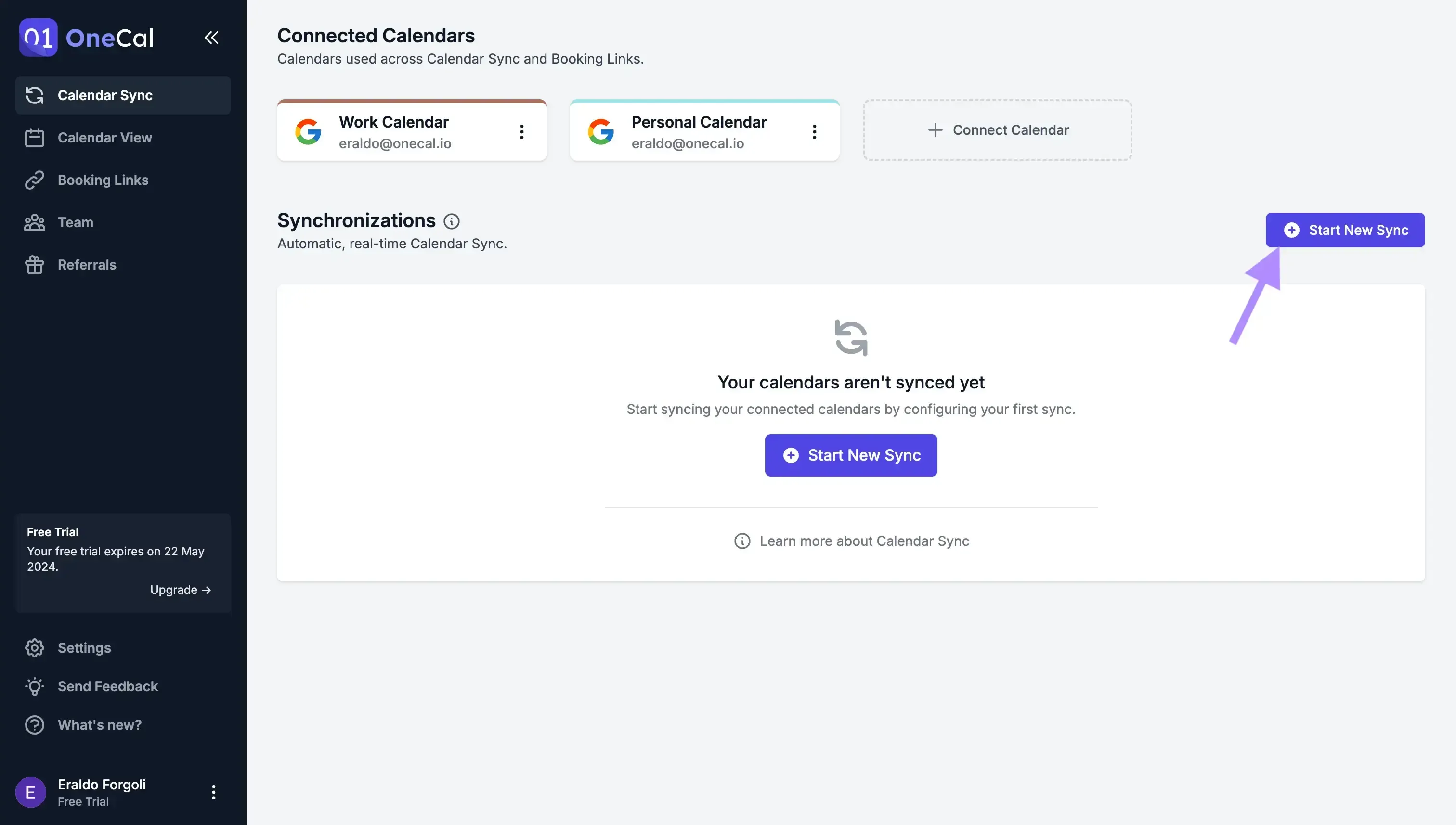
4. Select the merge direction
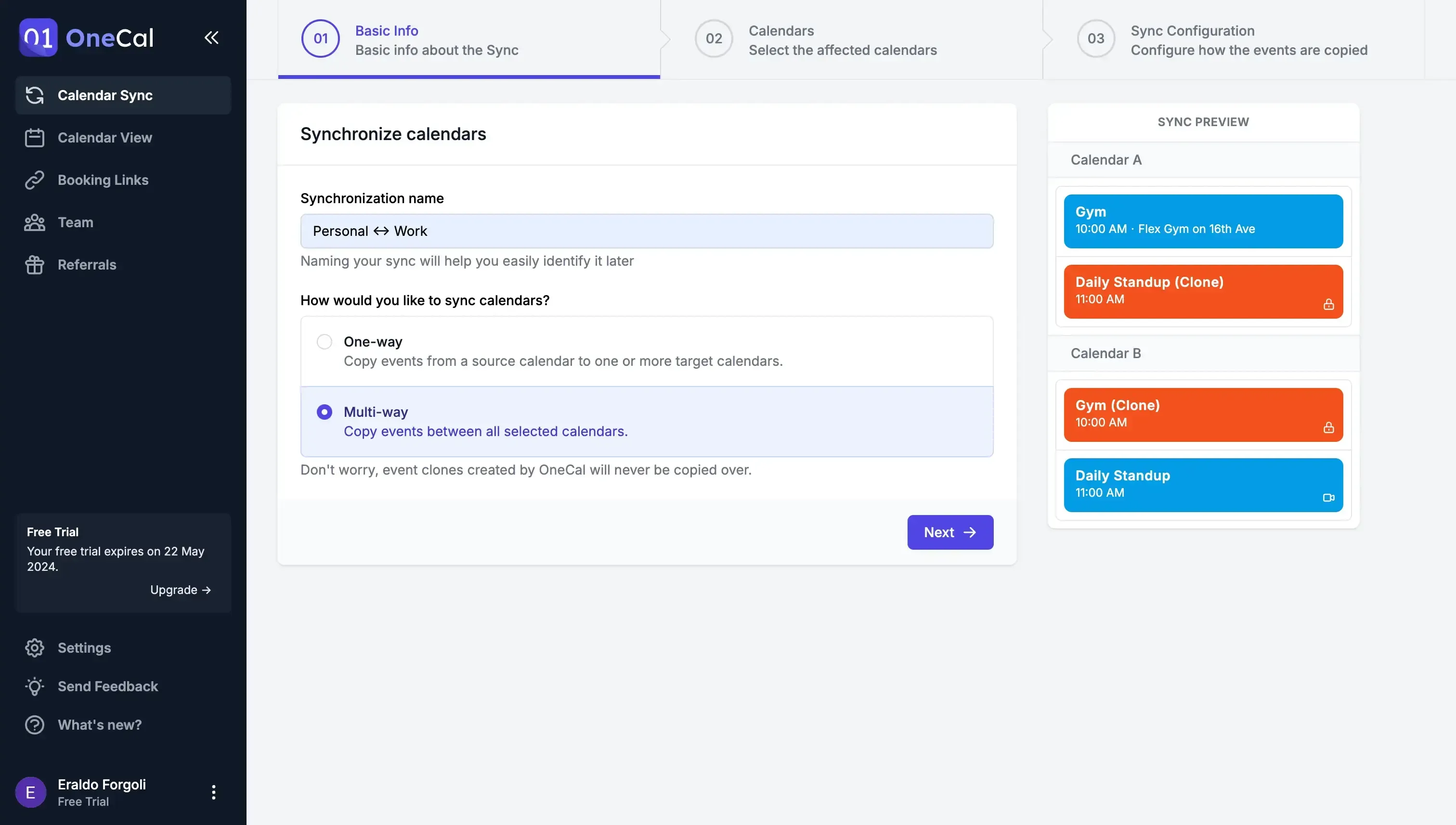
With OneCal, you can copy events from one calendar to another or from multiple calendars at the same time.
When merging two Google Calendars, we’ll select the ‘multi-way’ direction, which allows personal Google Calendar events to be cloned to the work calendar and vice versa.
5. Select the Google Calendars you want to merge
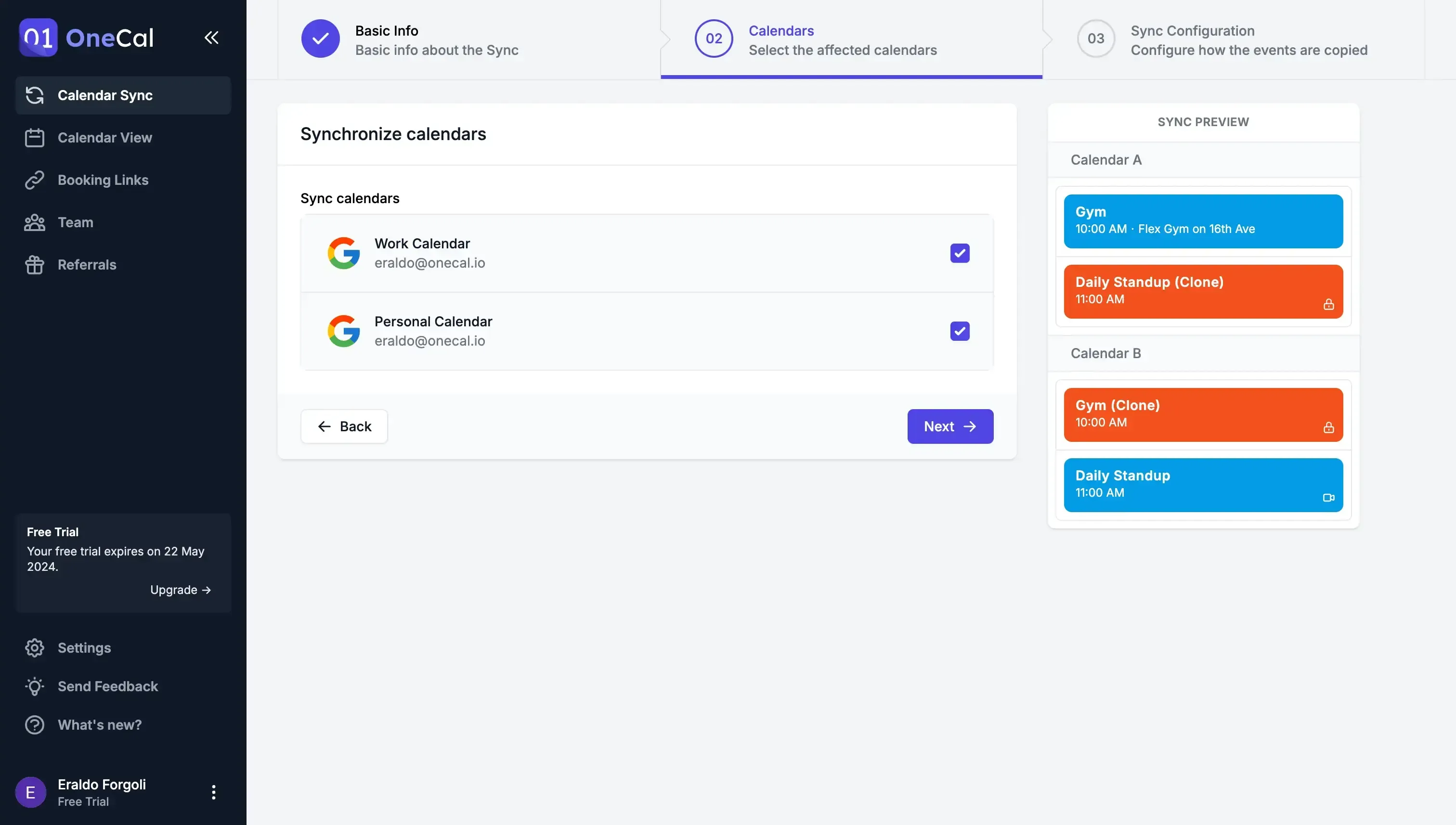
Select the personal and work calendars you want to sync. If you want to sync more than two calendars, all you need to do is connect them. After connecting them, you can simply select them to be merged, and OneCal does the rest.
6. Choose the merging rules

Opposite to Google Calendar Sharing, OneCal doesn’t require you to make the Google Calendar public or available to Google Search. OneCal gives you total control over what event properties are merged from one Google Calendar to another.
The Google Calendars are merged 🥳
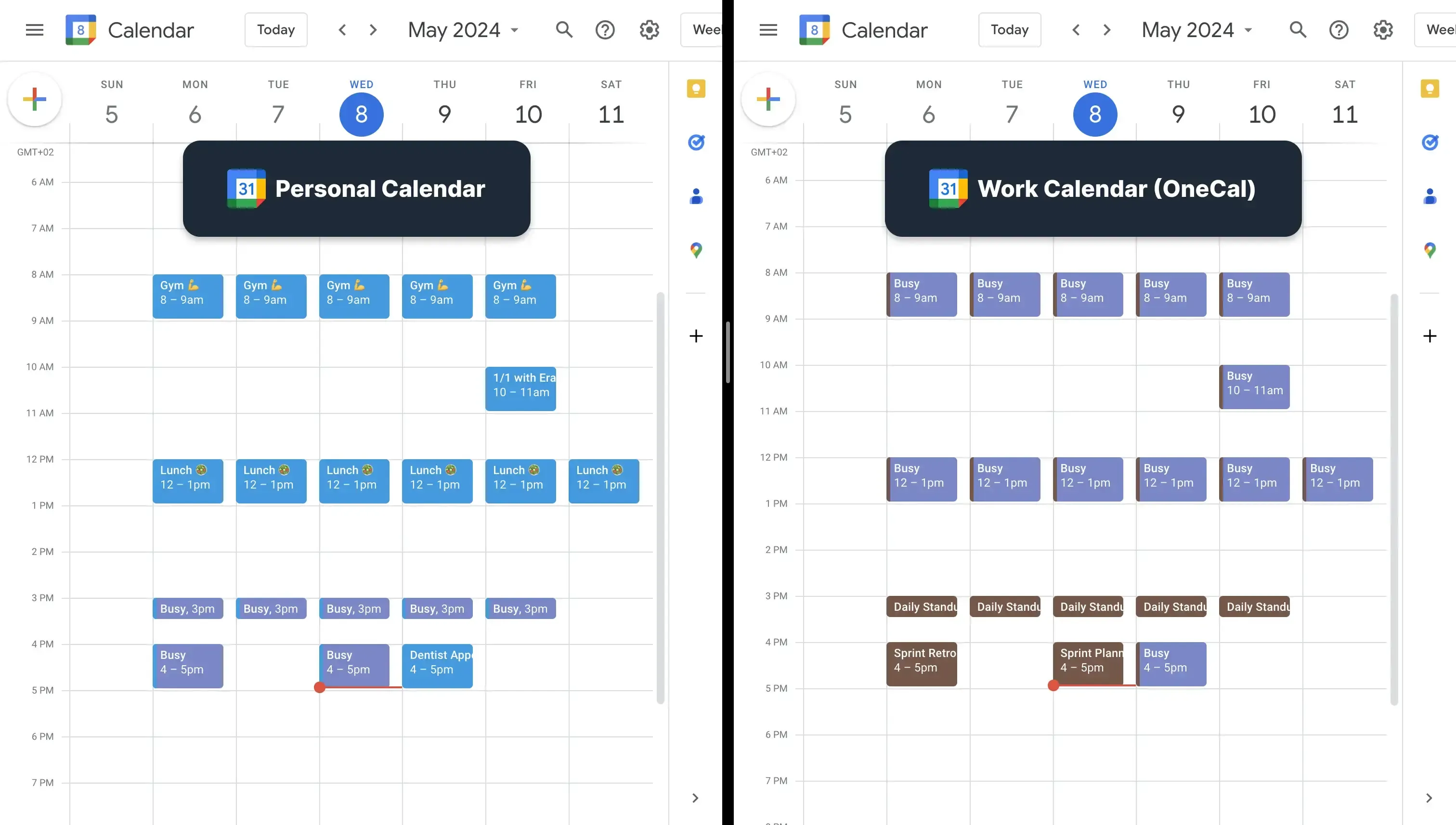
If you take the two Google Calendars we merged side by side, you'll see that they're now truly merged. Each Google Calendar is mirroring the other, making it so your availability is reflected to both.
You can also view your merged Google Calendars in OneCal Calendar View:

What are the benefits of Merging Google Calendars using OneCal?
Merges multiple Calendars directly and blocks time: OneCal merges all your calendars directly by blocking time from one Google Calendar to another. This means you won’t get double booked, as your coworkers will always know your full availability.
Merge Google Calendars with privacy in mind. Given that your Google Calendars might hold important information, it’s crucial only to merge non-sensitive information. With OneCal, you can select each meeting property to merge, avoiding security risks.
Time-saving Google Calendars merge set up. Using OneCal, you can merge multiple Google Calendars in less than one minute, knowing that the merge will run successfully.
Use OneCal to Merge Google Calendars
OneCal is the perfect Calendar Automation Tool to merge Google Calendars. The Google Calendars merge setup is very easy and reliable, saves you time, and lets you focus on what’s important.
You can sign up for a 14-day free trial, no credit card required, to experience a time-saving Calendar Automation Tool that merges your calendars, allows you to share scheduling links, view multiple calendars simultaneously, and much more.
FAQ
What’s the main drawback of merging Google Calendars by calendar sharing/importing?
You must make the source calendar public, and the copy only shows as a separate secondary calendar, so Google’s “Find a time” still ignores it, and scheduling conflicts remain.
Why doesn’t importing a personal calendar into a work account stop scheduling conflicts?
Because Outlook/Google scheduling tools only check the primary calendar. Imported calendars are secondary calendars, their availability is not taken into consideration, so your private events stay invisible to others.
How long can updates take when calendars are merged by importing an iCal link?
New or edited events can take up to 24 hours to appear in the destination calendar.
Does OneCal handle recurring events correctly?
Yes. Full series and any later edits sync instantly across all merged calendars.
Why use OneCal to merge calendars?
OneCal uses Google’s API to copy events directly between calendars in real time, without making them public, and while letting you choose what to merge between calendars, protecting your privacy.